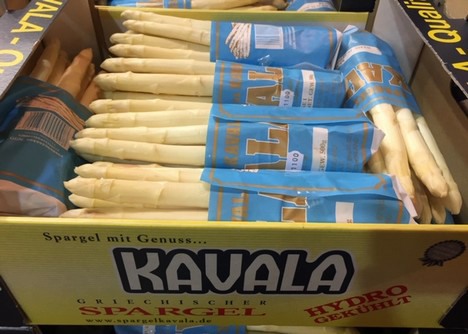On February 26th, the Munich Wholesale Market saw the first Greek asparagus of this year's season being marketed. Despite a slight delay compared to previous years, there is more produce available at the start of the season than usual, according to Theo Hatzivassiliadis, direct importer and managing director of Hans Kuffer Ltd, based at the Munich Wholesale Market. "Initial forecasts indicate that there might be a slightly higher volume compared to last year. However, this is highly dependent on the weather and can change rapidly," the Greece specialist notes.

Theo Hatzivassiliadis of Hans Kuffer Ltd (here during the visit to the wholesale market by FreshPlaza.de in 2023) focuses on the import and distribution of Greek asparagus.
Greek asparagus cultivation under pressure
Despite decades of tradition in asparagus cultivation, Greek production of this premium vegetable has increasingly come under pressure in recent years, Hatzivassiliadis adds. "Asparagus has lost its significance in all major growing areas, undoubtedly due to sharply rising production costs and a shortage of harvest workers. Consequently, it is simply no longer profitable for predominantly small-scale producers to cultivate asparagus." Other crops, such as kiwi, seem to be benefiting from this downward trend in asparagus, he adds.
At the same time, demand seems to continue to trend upwards. Hatzivassiliadis states, "Asparagus consumption is steadily increasing, as many consumers want to eat healthier and this particular group is increasingly turning to low-calorie vegetables like asparagus. Greek asparagus also has many other advantages. Thanks to reliable logistics and relatively short transport routes, the asparagus arrives in Germany just one and a half to two days after harvesting. This represents a significant competitive advantage compared to Spain or Peru. Moreover, the product has been notably fresh and of high quality in recent years, not least due to good sales and corresponding good product flow. Furthermore, Greek produce is offered at relatively affordable prices compared to other countries of origin, which in turn has a positive impact on demand," he concludes.

Greek white asparagus from the Kavala region. Green asparagus represents only a niche in cultivation and export, accounting for just a few percent.
For more information:
Theo Hatzivassiliadis
HANS KUFFER Fruchthandel GmbH
Munich Wholesale Market Hall
Mobile: 0162/2923477
Email: th@kuffer24.de
Website: www.kuffer24.de
